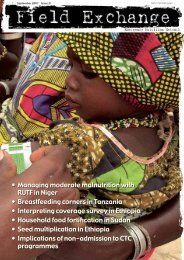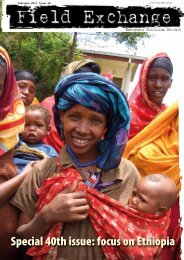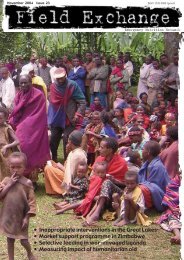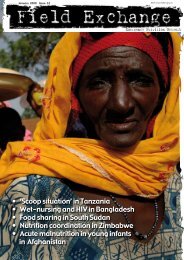Drought resistant 'banana' - Field Exchange - Emergency Nutrition ...
Drought resistant 'banana' - Field Exchange - Emergency Nutrition ...
Drought resistant 'banana' - Field Exchange - Emergency Nutrition ...
Create successful ePaper yourself
Turn your PDF publications into a flip-book with our unique Google optimized e-Paper software.
Agency ProfileNutriset, 2004Loading onto trucks at the Nutriset siteOn a freezing cold Tuesday inFebruary, at nine o’clock in the morning, I wasthe only person to get off the Eurostar service atFrethun, Calais. Met by Beatrice Simkins (incharge of NUTRISET’s international communicationand development), we embarked on a twohour drive through fairly uninspiringNormandy countryside until we arrived at theNUTRISET premises nestled amongst fields ofcows and horses. The distinctive blue and whitebuilding, although out of place in such a ruralsetting, seemed somehow appropriate for anorganisation which is unique in the humanitarianfield.On my arrival, I was introduced to two of thedirectors, Isabelle Sauguet and Michel Lescanne.Michel, who is the founder of NUTRISET, originallyworked in the Research and Developmentsection of a dairy industry. He had long wantedto set up a department specifically for developingfood aid products within the industry but‘met with resistance’. Hence the birth of NUTRI-SET.NUTRISET was established in 1986. It is aprivate company and was the first company toproduce a fortified milk based product for nutritionalrehabilitation of the severely malnourished.The now ubiquitous F100 and F75 therapeuticmilks produced by NUTRISET were developedout of the work of the ACF ScientificCommittee. NUTRISET’s primary aim is toproduce food exclusively for humanitarianemergencies. It is independent of any financialor industrial lobby and food is only provided forNGOs and UN agencies. NUTRISET has aproduction capacity of around 30 metric tons aday, with 35 staff working in production, logistics,development, finances and quality and research.As Isabelle explained, ‘all new staff receivelengthy instructions about the ethics of NUTRI-SET and the fact that it is primarily geared24Address:NUTRISETTel: +33 (0)2 32 93 82 82Fax: +33 (0)2 35 33 14 15Email:nutriset@nutriset.frInternet:www.nutriset.frFormed: 1986Director:Michel LescanneHQ staff: 32Annual budget(2003): Turnover of10 million eurotowards helping children through humanitarianrelief.’NUTRISET has a large research and developmentsection, which devotes itself to improvingand adapting products to emergency conditions.In other words, ‘developing products that canwithstand lengthy transport, harsh climates andcan be used in areas where there is limited orcontaminated water supplies’. Much of thedepartment effort goes into improving productspecification, e.g. increasing the shelf-life ofproducts. Isabelle described how NUTRISETmay occasionally be contacted by agencies whohave not been able to use donated therapeuticmilks due to excessive orders or mis-planning,i.e. predicting demand that never materialised.“This happened recently in Zimbabwe. Agenciesmay be worried about expiry dates and wastage.In these situations, NUTRISET are able to issue achecklist of questions and tests, which if followed,can show whether the product’s shelf-lifecan be extended. If the product is still viableNUTRISET will re-issue a certificate with anextended shelf-life”.After dressing up in sterile clothing (blue andwhite), I was shown around the productionplant. On the day of my visit, the plant was idlewith no batches due for production. This allowedme to see the plant and hear about itsworkings and the rigorous quality controlmeasures that are in place – food science wasnever my strong point.NUTRISET receives support from the Frenchgovernment agency for innovation (ANVAR) todevelop products. However, if successful (and sofar, most products have been), then the loan hasto be repaid. Technical advisors include a nutritionist,biochemist and polymer scientist. Thecompany is involved in many research projectswith NGOs and academics striving to improvefood products for emergencies. A large proportionof profits are re-invested in research, with80% of products developed through research.Products are either standardised or customised.Products 1 can be classified under four headings;i) Foods for treatment of severely malnourished,e.g. therapeutic milks (F100 and F75),Plumpy’nut, ReSoMal, therapeutic CMV(Minerals and Vitamins Complex)ii)Supplementary food for the generalpopulation, e.g. SP 450iii) Micronutrient supplements, e.g. QBmix,zinc tablets, Plumpy’sauceiv) Foods for infants and young children,including a special food for children bornto HIV+ mothersCurrent new products include QBmix, designedto prevent micronutrient deficiencies (especiallyNiacin, B1 and C). This is an aromaticpaste, which is a condiment for meals (see fieldarticle in this issue). NUTRISET are also workingon designing new alternatives for infant milkformula for HIV programmes.1All products are patented by Nutriset
















